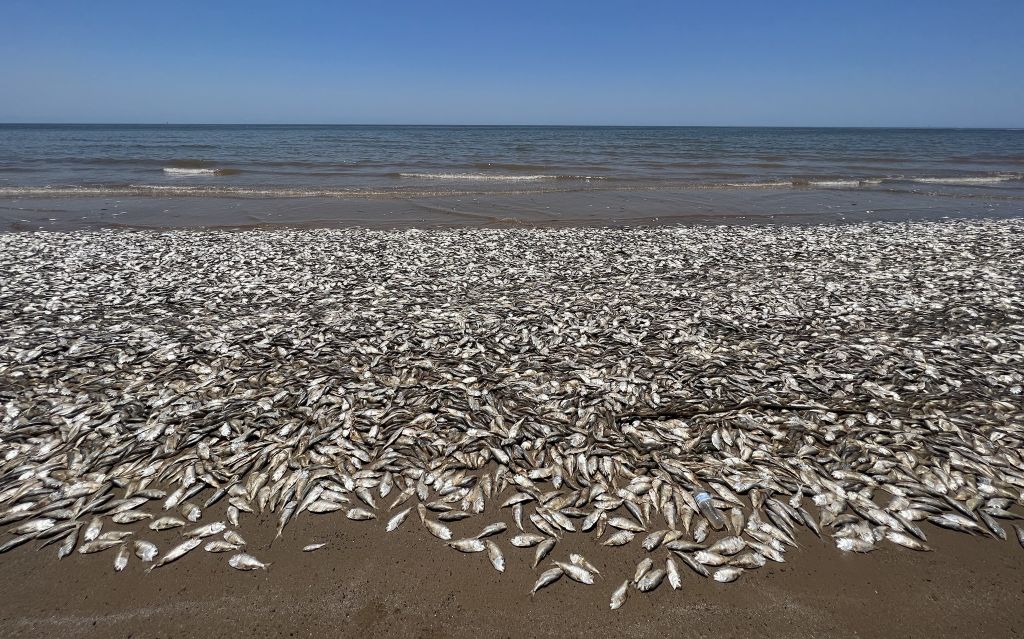“As we see increased water temperatures, certainly this could lead to more of these events occurring,” one expert said.
By Olivia Rosane. Published 6-11-2023 by Common Dreams

Hundreds of thousands of fish washed up dead along Texas beaches over the weekend as a “perfect storm” of weather, water, and temperature conditions depleted the oxygen they needed to survive.
While die-offs like these are naturally occurring, the climate crisis can make them ever more likely.
“As we see increased water temperatures, certainly this could lead to more of these events occurring,” Katie St. Clair, who manages the sea life facility at Texas A&M University at Galveston, told The New York Times Sunday, “especially in our shallow, near-shore or inshore environments.”
Thousands of dead fish began washing up on local beaches in Texas’ Brazoria County Friday, Quintana Beach County Park wrote on Facebook. The park wrote that the fish were mostly Gulf menhaden.
The carcasses continued to wash in on Saturday. Park supervisor Patty Brinkmeyer told CNN that the dead fish numbered in the “hundreds of thousands” since Friday morning.
In her 17 years at the park, Brinkmeyer said this was “by far” the largest of the three die-offs she had observed.
“You could literally see a straight-across mass of fish floating on the water,” she told CNN. “It looked like a big blanket.”
In the near-term, Brazoria County Parks Department director Bryan Frazier told The New York Times that the fish kill was caused by a “perfect storm” of conditions.
These were cloudy skies, calm waters, and warm temperatures, Quintana Beach County Park explained on Facebook.
“Cooler water is capable of holding much more oxygen than warmer water, and fish that find themselves in warm water can end up in big trouble,” the park said. “When water temperature rises above 70 degrees Fahrenheit, it becomes hard for menhaden to receive enough oxygen to survive.”
Because both water mixing and photosynthesis can add oxygen to the water, calm and cloudy days can also mean less oxygen for the fish to breathe.
In the longer term, a 2019 report from the Intergovernmental Panel on Climate Change found that the climate crisis was increasing low-oxygen events, also known as hypoxia, in coastal waters.
The Gulf of Mexico already has one of the largest low-oxygen areas in the world—known as a “dead zone” because fish and other marine life cannot survive there—caused by nutrient pollution from agricultural and urban runoff into the Mississippi River.
When oxygen gets too low near the sea floor, “fish and shrimp leave the area and anything that can’t escape—like crabs, worms, and clams—dies,” the National Oceanic and Atmospheric Administration (NOAA) said.
The Gulf is also extremely vulnerable to other climate impacts like sea level rise and more intense hurricanes.
“I would say all of those things, put together, are going to create enormous pressure on the coastlines in the Gulf of Mexico—leading to the potential loss of wetlands and damage to inshore communities,” Dr. Lisa Levin, an oceanographer at University of California, San Diego, and one of the authors of the 2019 report, told WWNO at the time.
Additional die-offs of menhaden specifically could add to those pressures, as St. Clair told the Times that the fish play an important role in the ecosystem.
“You could see cascading impacts if we continue to have these large fish kills,” she said.
In the immediate future, things are looking up for the Texas coast.
“It appears the last of the fish have washed in. The most recent are deteriorated to the point of being shredded skeletons. Our beach crew should have the pedestrian beach cleared today and begin the Quintana public beach tomorrow,” Quintana Beach County Park wrote on Facebook Sunday.
NOAA also predicted June 5 that this summer’s Gulf dead zone would be smaller than average, at approximately 4,155 square miles rather than 5,364 square miles.
However, for some, the incident remains a sign of a mounting emergency.
“Another example of how the fossil fuel industry destroys the planet’s life-nourishing ecosystems,” lawyer and human rights advocate Steven Donziger tweeted Sunday.
This work is licensed under Creative Commons (CC BY-NC-ND 3.0)

